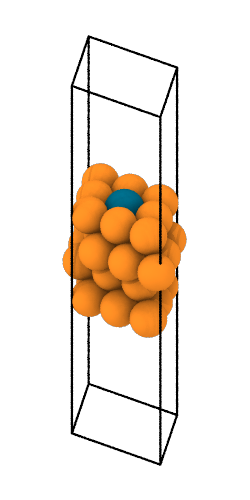Single Atom Alloys
 Single atom alloys (SAA) consist of a transition-metal host
with lone dopant atoms embedded at the surface. This
dispersion leads to unique electronic properties.
Single atom alloys (SAA) consist of a transition-metal host
with lone dopant atoms embedded at the surface. This
dispersion leads to unique electronic properties.
With the autocat.saa
module, we can generate structures of these
systems to study them further. The main function for this purpose
is generate_saa_structures
where multiple SAA structures can
be generated simultaneously.
>>> from autocat.saa import generate_saa_structures
>>> saa_dict = generate_saa_structures(
... host_species=["Fe", "Cu"],
... dopant_species=["Pt", "Au"],
... facets={"Fe": ["110"], "Cu": ["111"]},
... n_fixed_layers=2,
... write_to_disk=True,
... )
Pt1/Fe(bcc110) structure written to ./Fe/Pt/bcc110/substrate/input.traj
Au1/Fe(bcc110) structure written to ./Fe/Au/bcc110/substrate/input.traj
Pt1/Cu(fcc111) structure written to ./Cu/Pt/fcc111/substrate/input.traj
Au1/Cu(fcc111) structure written to ./Cu/Au/fcc111/substrate/input.traj
>>> saa_dict
{'Fe': {'Pt': {'bcc110': {'structure': Atoms(...),
'traj_file_path': './Fe/Pt/bcc110/substrate/input.traj'}},
'Au': {'bcc110': {'structure': Atoms(...),
'traj_file_path': './Fe/Au/bcc110/substrate/input.traj'}}},
'Cu': {'Pt': {'fcc111': {'structure': Atoms(...),
'traj_file_path': './Cu/Pt/fcc111/substrate/input.traj'}},
'Au': {'fcc111': {'structure': Atoms(...),
'traj_file_path': './Cu/Au/fcc111/substrate/input.traj'}}}}
- for Fe (Cu) we only need the 110 (111) facet
- the bottom 2 layers are held fixed
When writing to disk the following directory structure is used:
.
├── Cu
│ ├── Au
│ │ └── fcc111
│ │ └── substrate
│ │ └── input.traj
│ └── Pt
│ └── fcc111
│ └── substrate
│ └── input.traj
├── Fe
│ ├── Au
│ │ └── bcc110
│ │ └── substrate
│ │ └── input.traj
│ └── Pt
│ └── bcc110
│ └── substrate
│ └── input.traj
N.B. by default, initial magnetic moments are given to the dopant species based upon the ground state magnetic moment of the species